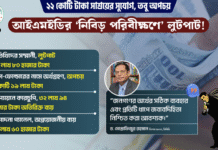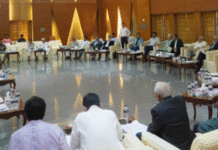
DHAKA—Bangladesh’s largest public protests in over two decades swelled, as tens of thousands of demonstrators took to the street Friday to demand the death penalty for people convicted of war crimes in the country’s 1971 war of independence.
Meanwhile, clashes have intensified between security forces and Islamist protesters who claim Prime Minister Sheikh Hasina’s government is using a war crimes tribunal it set up in 2010 to unfairly hound religious conservatives. On Thursday, two bystanders died when police fired rubber bullets on demonstrators, who were lobbing homemade bombs and vandalizing vehicles, police said.
Both sets of protests illustrate how the country remains polarized over the events 40 years ago, despite pledges from Ms. Hasina’s secular-leaning administration the war crimes tribunal would be a model to the world and heal wounds of the civil war era.
A steady stream of people including middle-class families with children have flowed into Shahbag, a leafy boulevard in the heart of Dhaka, the capital, calling for those on trial for war crimes to be hanged. These protests, which so far have not come into contact with the Islamist-led demonstrations, have remained peaceful.
Hundreds of thousands of civilians died in 1971, many of them murdered by Islamist militia that opposed the country breaking away from Pakistan. Eight of ten people on trial at the war crimes tribunal are from the Jamaat-e-Islami, the largest Islamist party and an ally of the main opposition Bangladesh Nationalist Party.
The tribunal handed down its first verdict in January, sentencing in absentia a former Jamaat-e-Islami leader to death. A second ruling this month, sentencing Abdul Quader Molla, a senior party leader, to life in jail, angered many of the protesters at Shahbag, who say he should have been hanged.
“He was found guilty of mass murder and so the verdict of life imprisonment does not make sense,” said Asif Mohiuddin, coordinator of a bloggers’ network that called for the street protests. “The people demand justice for the victims of 1971.”
On Friday, demonstrators waved flags, sang patriotic songs and danced in Shahbag, emboldened by the large numbers. Many wore headbands and carried placards with slogans such as “Hang all Razakars (Islamists).”
While Islamist parties draw support in rural areas, many middle-class urban dwellers, usually secular in outlook, back the call for harsher sentences.
The Awami League-led government of Ms. Hasina has moved to meet the protesters’ demands. Ms. Hasina has been quoted in Bangladesh’s media this week as saying judges should take popular sentiment into account when formulating decisions.
On Thursday, Awami League lawmakers introduced in Parliament an amendment to the law governing the war crimes tribunals to allow prosecutors to appeal for harsher sentences. The original law only allows the state to appeal against an acquittal.
Human rights group said the amendment, which needs to be voted on in Parliament to become law, undermines promises the tribunal would follow international standards of justice.
New York-based Human Rights Watch, in a statement Thursday, said the move appeared designed to allow an appeals court to overturn Mr. Molla’s life sentence and impose the death penalty. It also faulted the police for using excessive force against demonstrators.
“Justice for victims of war crimes and other serious abuses during the 1971 war of liberation is essential,” said Brad Adams, Asia director at Human Rights Watch. “But a government supposedly guided by the rule of law cannot simply pass retroactive laws to overrule court decisions when it doesn’t like them.”
Government ministers have dismissed concerns of meddling in the court’s workings. Law Minister Shafique Ahmed said Thursday in Parliament that the amendment had been drafted to ensure equal rights for both the government and the accused.
Critics of the process, including Bangladesh’s Islamist politicians, say Ms. Hasina has used the tribunal to attack her political opponents and to distract attention from the weakening economy.
“The main aim of this drama is to ban the Jamaat-e-Islami on grounds of popular demand,” said Shafiqul Islam Masud, a leader of the party. “The police is already using excessive force on our activists, as if we are a terrorist outfit rather than a mainstream political party represented in Parliament.”
The accusation of excessive force was denied by Monirul Islam, a police spokesman, who said security forces were trying to maintain law and order.
Although most protesters at Shahbag were born after the war, many seem convinced of the Islamists’ guilt.
“We’re not legal experts,” said Parvez Alam, a well-known blogger and one of the coordinators of the group that organized the protests. “The people have raised the demand that all war criminals must receive maximum punishment. It’s up to the government and courts to execute the people’s verdict.”
The protests have dominated the news agenda in Bangladesh, garnering largely positive coverage. Commentators have noted the large numbers reflect disappointment with constant political instability, corruption and economic stagnation.
But some observers have criticized what they see as the gathering’s narrow focus.
“It’s great that people are coming together, and there is no doubt that those convicted of war crimes should be severely punished,” said Shahana Siddiqui, a writer and development activist. “But this is the time for us to channel our energy into stronger democratic practices, not just scream for blood and revenge.”
Source: WSJ









